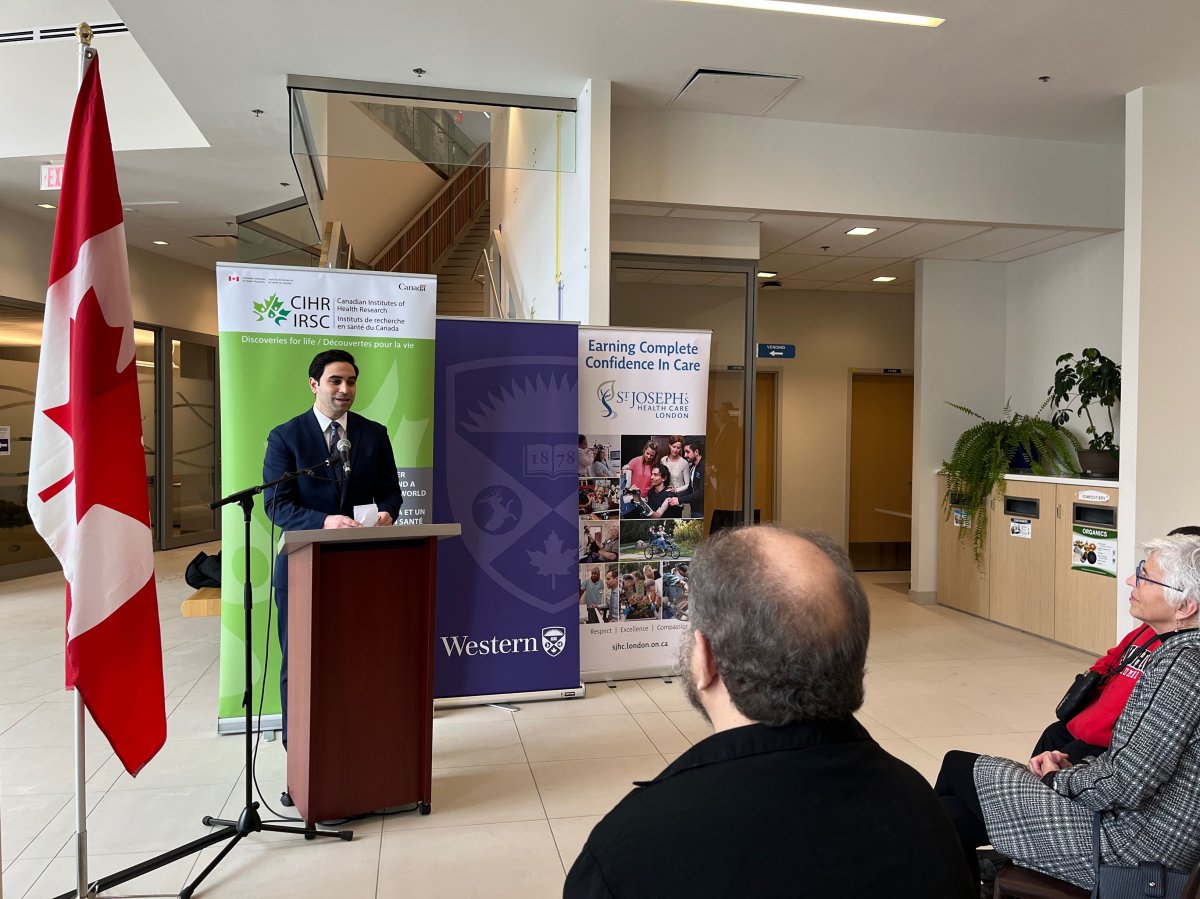The federal government will dole out $12 million in funding to 14 research teams across Canada, including two in London, Ont., in a bid to improve care continuity during transitions in care.

The funding, unveiled by London North Centre MP Peter Fragiskatos during an announcement at Western University, comes from the Canadian Institutes of Health Research, a federal agency, through its Transitions in Care initiative, in partnership with Mitacs and the Azrieli and Rossy foundations, the government says.
Transitions in care, when the responsibility of caring for a patient changes hands for reasons including a change in age, health status or location, can lead to incomplete, delayed, or poor quality care for the patient, the government says. Indigenous Peoples, new immigrants and those with complex medical conditions are more vulnerable to poor outcomes.
“People living in Canada routinely experience transitions in care as they navigate the health system,” Fragiskatos said in a statement.
“The important research that will be done here in London and at institutions across the country will help develop meaningful approaches to make these transitions easier for patients and caregivers.”
Two research teams based at Western University’s Schulich School of Medicine and Dentistry will receive nearly $1.5 million in funding as part of the announcement, according to Western.
One team will evaluate the Primary Care Diabetes Support Program run by St. Joseph’s Health Care London, looking at addressing transitions in care for medically complex, unattached and socially complex patients with diabetes, according to the announcement.
According to Western, the research team will receive nearly $900,000 for the study.
The team is looking to show, among other things, how the program is improving the quality of life of patients, how many complications are prevented, and what the related cost savings are, said Dr. Maria Mathews, a professor in Schulich’s Department of Family Medicine who is involved in the study.

Get weekly health news
The Primary Care Diabetes Support Program has been in operation for 14 years and sees roughly 5,000 patients every year, Mathews said, adding the program has had great success in managing clinical outcomes with patients and optimizing patient quality of life.
“We want to show that this really innovative model of family medicine saves health system costs, and this kind of prevention is really good for the health care system and that we should be doing more of it,” Mathews said.
“We should be having more of these sites for diabetes patients, and we should be considering what other chronic illnesses could be well-served by this type of really good team-based primary care.”
The other London team to receive funding will evaluate on the Transitional and Lifelong Care Program, based at St. Joseph’s Parkwood Institute, looking at ways to ensure seamless and lifelong care for adults with childhood-onset disabilities, like cerebral palsy and spina bifida.
The research team will receive just over $500,000 for the study, Western says.
“Many of the participants in studies that have talked about transition have really described it as falling off a cliff,” said Dr. Laura Brunton, an assistant professor at Western’s School of Physical Therapy, who is involved with the study.
“I want to make sure that there’s something there to catch these kids when they fall off that cliff of paediatric care to adult care. The reason I think it has taken such a long time for this to exist is because there hasn’t been people who are interested and qualified to treat these individuals once they turn 18.”
St. Joseph’s Transitional and Lifelong Care Program launched at the end of 2014, and has between 750 and 850 patients, said Dr, Caitlin Cassidy, an associate professor at Schulich and a physiatrist at Parkwood Institute.
Patients who come to the program have different needs and abilities, she says. Some may be experiencing gaps finding someone qualified to treat their pain, while others may need assistance finding someone to get a specialized wheelchair, or help them move out of their parents house.
“There’s lots and lots and lots of different things that we might discuss as part of our clinical care for this patient population. It’s very much not just medical, it’s meant to be very holistic,” said Cassidy, who is also involved in the study.
Brunton says they’re interested in comparing the outcomes of patients with access to the program with those receiving care from their GP or through a hospital.
“We want to make sure that we can see if this is a valuable thing that could go to other centres,” she said.
“We know that this centre serves London and the surrounding area, and we can see with the high number of patient volume that goes through this clinic, that there’s probably a need for that elsewhere across Canada.”
The 12 other research teams receiving funding can be found on the Government of Canada website.
— with files from Andrew Graham








Comments